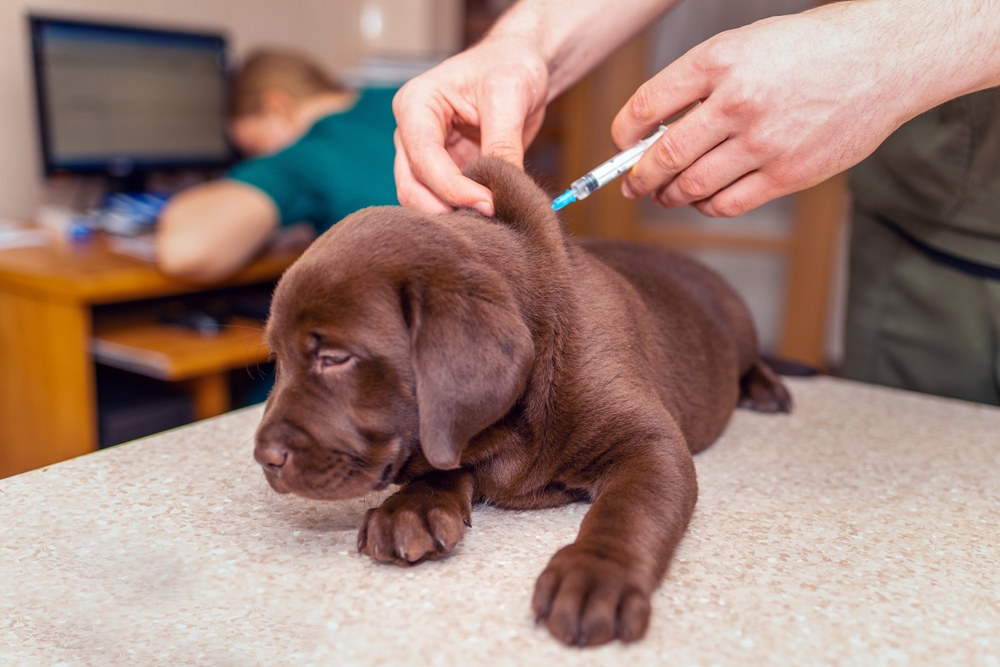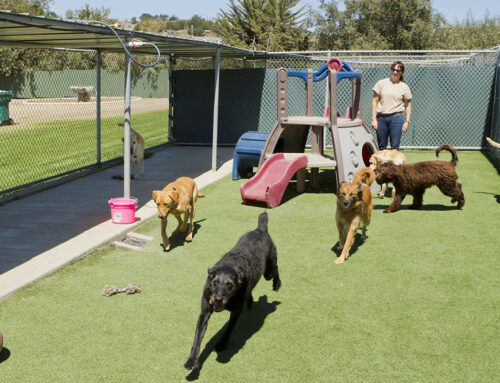Bringing home a new puppy is an exciting time filled with love, cuddles, and, of course, the occasional puddles. An essential part of puppy wellness is vaccines to ensure your pup grows into a healthy adult dog. Vaccines are broadly categorized into core and noncore vaccines that protect against infectious and often life-threatening illnesses. Our Memorial Villages Animal Hospital team explains what vaccines your puppy needs, their importance, and the recommended vaccine schedule.
Core vaccines for puppies
Core vaccines are considered necessary for your puppy’s health and safety, regardless of geographical location or lifestyle. Core vaccines protect against highly contagious diseases that pose a significant threat to the dog population’s health and, in some cases, that of people. Core vaccines for puppies include:
- Canine distemper virus (CDV) — Distemper is a severe viral disease affecting unvaccinated dogs’ respiratory, gastrointestinal (GI), and central nervous systems. To protect your puppy, they will need their first vaccine dose at 6 to 8 weeks of age, followed by booster shots every three to four weeks until they are 16 to 20 weeks of age. A booster is given when your puppy reaches 12 months of age, then every three years.
- Canine parvovirus (CPV) — Parvovirus is a highly contagious virus that results in severe GI illness, including persistent vomiting and bloody diarrhea. Puppies are particularly susceptible to parvo. The CPV vaccine should be started when your puppy is between 6 and 8 weeks of age, with boosters every three to four weeks until your puppy is 16 to 20 weeks of age. A booster will be given when your puppy reaches 12 months of age, then every three years.
- Canine adenovirus (CAV-2) — Also known as canine hepatitis, CAV-2 causes liver inflammation and respiratory disease. Signs include decreased appetite, lethargy, coughing, and mild fever. In severe cases, edema and jaundice may be present. The CAV-2 vaccine is given in combination with the distemper and parvovirus vaccines, following the same schedule.
- Rabies — Rabies is a fatal viral disease that affects the central nervous system and is transmissible to mammals, including people and pets. Because of this disease’s severity, vaccination is required by law. To protect your puppy, they will need their first rabies vaccine dose at 12 to 16 weeks of age, followed by a booster at 10 months of age, and then every one to three years, depending on local regulations.
Noncore puppy vaccines

Noncore vaccinations are optional and depend on your furry friend’s exposure risk, which is influenced by their geographical location, lifestyle, age, and specific risk factors. Noncore vaccines protect against diseases that are not as universally threatening as those covered by core vaccines. As your puppy grows into adulthood, they may need the following vaccines:
- Bordetella bronchiseptica — Also known as kennel cough, Bordetella is a bacterial infection that causes respiratory illness, including a telltale cough and other flu-like conditions. Most boarding and grooming facilities require dogs to have this vaccine.
- Canine influenza virus (CIV) — CIV causes a respiratory illness similar to flu in people, including coughing, runny nose, and fever. CIV is akin to Bordetella and other infections in the canine infectious respiratory disease (CIRD) complex. CIV vaccines are typically advisable if your pet will be exposed to other dogs, such as in boarding facilities.
- Leptospira spp. (leptospirosis) — Leptospirosis is a bacterial infection affecting the kidneys and liver and can be transmitted between pets and people. Dogs who spend a lot of time outdoors, including going to natural areas and dog parks, have a high leptospirosis risk. The vaccine may be recommended if your puppy will be exposed to high-risk areas.
- Borrelia burgdorferi (Lyme disease) — Lyme disease is a tick-borne illness that affects the joints and kidneys. This vaccine is often recommended for dogs who spend a lot of time in natural areas. Texas has an abundant tick population, so we may recommend this vaccine if you take your dog hunting or engage in other outdoor activities.
Vaccinations are crucial for puppies’ preventive health care, protecting them from potentially life-threatening diseases. Core vaccines are necessary for your furry friend, while noncore vaccines should be considered based on their risk factors. Our Memorial Villages Animal Hospital team will develop a vaccination plan tailored to your puppy’s needs, ensuring a healthy start to a long and happy life. Schedule your new puppy’s wellness exam with our team.









Leave A Comment